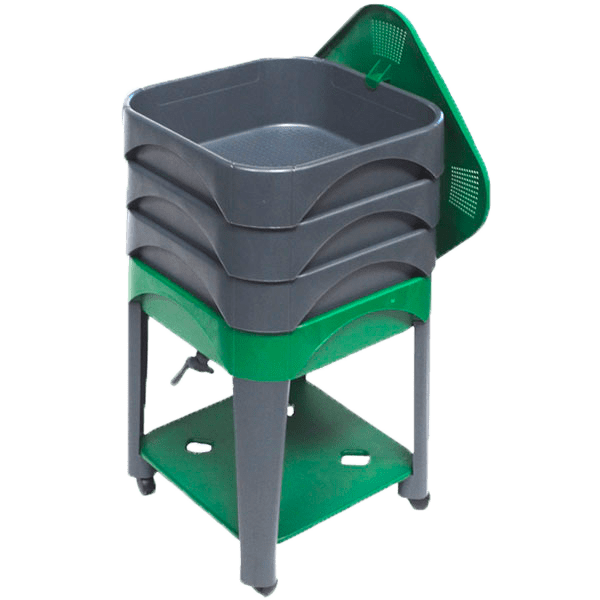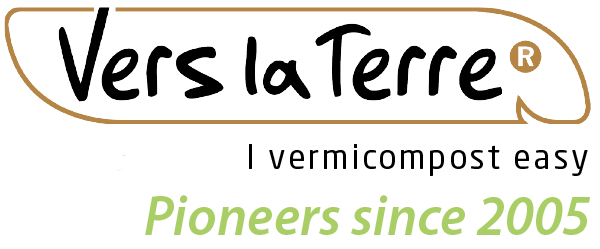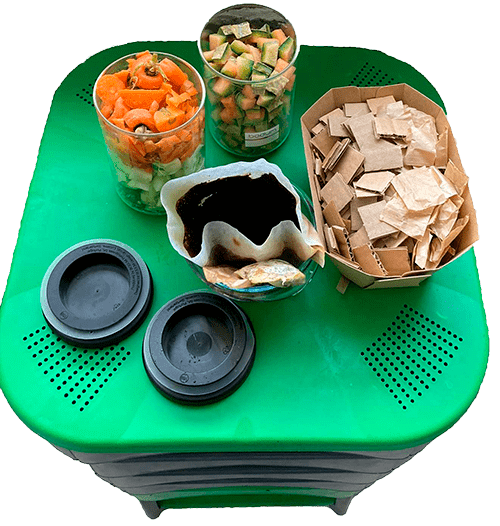Everything you need to know about vermicomposting
The vermicomposter, a friend of urban life
Vermicomposting, also called "vermicomposting" by our friends in Belgium and Quebec, is in fact the decomposition and transformation of our organic matter and waste into worm poo! Put more scientifically, this natural process of bio-oxidation transforms and stabilizes unused organic matter (kitchen waste and cardboard) into elements useful for plant nutrition, thanks to the action of compost worms, aided by certain soil micro-organisms.
The result is vermicompost, a stable, mature product, black and lumpy in appearance, with a pleasant smell of undergrowth and fresh earth, and a juice, liquid fertilizer, also known as vermicompost.
Taking up very little floor space, an apartment vermicomposter's design, composition and color will blend in perfectly with your kitchen! Ideal for disposing of organic waste in an instant and quickly obtaining fertilizer (solid and liquid fertilizer: vermicompost and juice).
Originating in Anglo-Saxon countries (United States, Canada and Quebec, Australia and New Zealand) in the 1950s, vermicomposting has since spread to Europe, India, Asia and even Africa.

Worm composting and composting:
What are the differences?

Seasonality
Composting and vermicomposting can be carried out all year round. However, during the winter, the composting process is much slower, and if the winter is very harsh, the ice will prevent the soil micro-organisms and compost worms from coming to work: the system slows down and the waste is no longer decomposed.
The vermicomposting process, on the other hand, is carried out indoors, and knows no seasons!

Vermicomposting is odorless!
Composting and vermicomposting don't smell bad. In an apartment vermicomposter, it's the worms who, thanks to the enzymes in their intestines, remove the smell of decomposing waste by digesting it. Their constant movement provides the oxygen needed to aerate the vermicompost and prevent the development of new bacteria (also known as anaerobes). They're the smelly ones!
The only smell associated with an apartment vermicomposter is that delicious humus scent you get when walking through the undergrowth... hmmm!

Vermicompost is richer than compost!
Vermicompost is the best organic, natural and biodynamic soil improver : produced by the digestion of a living animal, it is stable and directly assimilated by plants, unlike compost, which can take several months to stabilize. Vermicompost enriches soil faster than compost, thanks to worms, bacteria and other micro- and macro-organisms. They're gardeners' and plants' most loyal friends! Earthworms are the champions of soil fertility, transforming organic matter into humus. In fact, vermicompost is an amendment that generously enriches the soil by being directly assimilated by plants. With no risk of burning young shoots or roots, it can be used pure or mixed with soil or potting compost, to repot plants or restructure impoverished soil.

Minimal intervention
Traditional composting requires human intervention to speed up the degradation process: stirring and watering allow oxygen to circulate and micro- and macro-organisms to live, breathe and decompose the organic materials and waste brought in. Recycling your waste in an apartment vermicomposter, on the other hand, requires no watering or turning: the worms do all the work, and that's just as well, because it's not always pleasant to put your waste in the garden compost bin in winter or when it's raining... Simply lift the lid and drop in your waste and cardboard: the worms will do the rest ! Harvesting is a whole lot simpler, too. With the help of the spigot, juices are easily collected, and thanks to its stackable work trays, vermicompost recovery is a breeze !

Vermicomposting, a cold process
Cold? This means that there is no thermophilic phase that would lead to a rise in temperature (see composting). Inside an apartment vermicomposter, the temperature is ambient and remains relatively stable thanks to the low height of the superimposed trays (maximum 20cm high), thus avoiding heat rises (in the case of standard composting, rises to 70°C can be measured in the compost heaps). What's more, our worm friends don't give off methane! So they can't be compared to cows. But no thermophilic phase doesn't mean that pathogens can't be destroyed. In fact, worms reduce bacteriological risks and diseases thanks to the microbial activity of their intestines!

A vermicomposter is faster..
Compost worms are fabulous : they eat almost their own weight a day and never sleep, working in nature's service 24 hours a day ! With them, the breakdown of organic waste is much faster than with traditional composting, where materials decompose over a period of 6 to 12 months. Worms also stimulate the microbial population, further accelerating the transformation of organic residues. Controlled temperature, oxygen, regulated humidity, a balanced diet (fresh waste + cardboard) and the absence of predators make our worm composters a veritable paradise on earth for our worm friends!

... and simpler!
Humidity is regulated according to the inputs you balance (fresh waste + cardboard). The spigot at the base of the vermicomposter enables quick and easy collection of the liquid fertilizer. The system of superimposed trays ensures clean harvesting of the vermicompost, with the ready-to-use vermicompost in the first (bottom) tray. Compost, on the other hand, is often considered more difficult to collect, even though some composter models feature collection traps in the lower section, which are not very practical..

Reduce your waste by half
An apartment vermicomposter helps protect the environment! By recycling your daily waste and cardboard yourself, you can reduce the average volume of your household garbage cans by 40-50% : a simple way of avoiding the costly proliferation of waste processing plants.
"Prince Lombric and the Beautiful Bacteria
in the dormant soil
Behind the earthworms lies an organized, mutualistic and functional system : the drilosphere. This is the worms' space, and it works like Sleeping Beauty awakened by a Prince. In the role of the Belle : micro-organisms (bacteria), able of digesting a good proportion of all natural organic elements, but unable to move around for very long once this food has been consumed. In fact, once they've eaten all that food, they go into a deep sleep and don't wake up until several months later..
Then come the Princes Charming, in the unusual guise of soil invertebrates, annelids and insects. The problem is that, while the latter are extremely mobile, they suffer from their inability to digest the debris on which they feed! Well, our friends the bacteria, ingested by the Prince Lombric with a little water and soil, and mixed with a hint of intestinal mucus, are going to wake up and help with the digestion !
Patrick Lavelle, Professor at the University of Paris 6

